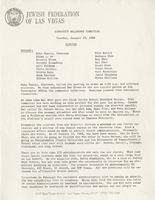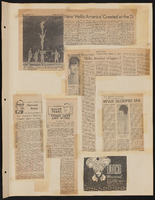Search the Special Collections and Archives Portal
Search Results
Rita Deanin Abbey oral history interview
Identifier
Abstract
Oral history interview with Rita Deanin Abbey conducted by Claytee White on November 29, 2014 for the Boyer Early Las Vegas Oral History Project. The artist and UNLV Emeritus Professor of Art discusses her early education and training in art that led her to work in sculpture, painting, stained glass, and other mediums. She also talks about her pieces created for the Jewish community in Las Vegas, Nevada.
Archival Collection
Minutes and by-laws, 2001 September-2002 December
Level of Description
Archival Collection
Collection Name: Temple Beth Sholom Records
Box/Folder: Box 10
Archival Component
Roger Bryan oral history interview
Identifier
Abstract
Oral history interview with Roger Bryan conducted by Paul Murphy on February 27, 1979 for the Ralph Roske Oral History Project on Early Las Vegas. Bryan, who was the principal of Harvey Dondero Elementary School at the time of the interview, mainly discusses his background in education and his experiences teaching at various schools around Southern Nevada. Bryan mentions several of the cities he lived in prior to coming to Las Vegas, Nevada as well as the various parts of town he lived in after arriving. He also talks specifically about the schools he attended in Las Vegas, superintendents in charge of the district, his decisions while on the school board, the extent of vandalism in schools, and how the school district has changed over the years. Bryan finalizes the interview with a discussion of the most influential teachers he had when he was a student.
Archival Collection
Lee, Rozita Villanueva, 1934-
Born in 1934 in Lahaina, Maui, Hawai'i as the seventh of seven daughters of a sugar plantation crew boss, Rozita Villanueva Lee recalls a privileged life, because when her father became a boss, the family got electricity, a telephone, indoor plumbing, and fluorescent lighting in their house. The camps were organized by nationality: the Filipino workers and their families lived in one camp, and the Japanese, Chinese, Portuguese, and "haole" workers and their families each lived in their own.
Person
Brooks, Hershel, 1930-
Hershel Brooks was born December 3, 1930 in Brooklyn, New York. He was raised in an orthodox Jewish household, along with his four siblings, and attended Jewish community schools before pursuing his rabbinical studies. He studied at TelsheYeshiva in Cleveland, Torah Vodaath in New York, and Jewish Theological Seminary in New York.
Person

Jewish Federation correspondence, meeting minutes, and other records, item 10
Description
Community Relations Committee meeting minutes for the Jewish Federation of Las Vegas, Nevada, January 19, 1988.
Audio clip from interview with Justice Michael Cherry, September 19, 2014
Date
Archival Collection
Description
Part of an interview with Justice Michael Cherry on September 19, 2014. In this interview, Justice Cherry discusses connections with Jewish casino operators. He also talks about losing to, then representing, unions in court proceedings. He was later endorsed by the unions when he ran for office.
Sound
Bernice Schiffman UNLV Memorial Scholarship Foundation scrapbook, 1970-1977
Level of Description
Archival Collection
Collection Name: Temple Beth Sholom Records
Box/Folder: Oversized Box 3
Archival Component

